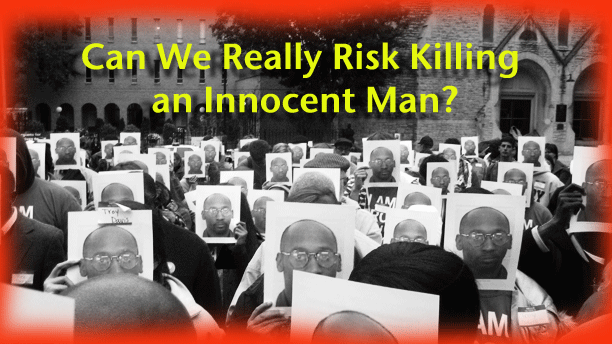
Late on an August night in 1989, an off-duty Savannah police officer named Mark Allen MacPhail tried to intervene when he saw a homeless man being pistol whipped in a restaurant parking lot by another man. But as MacPhail ran toward the scene, the person doing the whipping turned his .38 on the approaching officer and fired three times, killing the father of two who was trying to be a good Samaritan.
In short order, then-20-year-old Troy Anthony Davis was arrested and, in 1991, tried and convicted of the murder of Mark Allen MacPhail, and sentenced to death.
Other than the bullets, there was no physical evidence at the crime scene, and no gun was ever recovered, so Davis was convicted largely on the basis of witnesses. Over the years, however, seven of the nine primary witnesses have recanted saying that they were pressured to ID Davis when they did not see him do the shooting at all. One of the two witnesses against who has not disavowed his or her story is a man named Sylvester “Redd” Coles whom other witness now say was, in fact, the man who did the beating and the shooting. Interestingly, back in 1989, it was Coles who went to the police and pointed the finger at Davis.
Now more than 20 and many appeals later (Including a trip to the U.S. Supreme Court), 42-year-old Davis is scheduled to die on September 21, this Wednesday. MacPhail’s mother says Davis’s execution will bring her and her family “peace.”
The only thing that stands between Davis and a lethal injection is the Georgia Board of Pardons and Paroles which will hear Davis’s petition for clemency on Monday.
Although Davis has hundreds of thousands supporters all over the world, including such unlikely people as William Sessions (the former Director of the FBI under Presidents Ronald Regan, George HW Bush and Bill Clinton), 1,500 legal professionals, more than 3,300 religious leaders, 26 death-row exonerees and 110 relatives of murder victims, absent the magic of DNA or some other conclusive evidence (like, say, someone else—Redd Coles, maybe— confessing convincingly to the murder), there is no way to conclusively prove Davis innocent—if in fact he is innocent. (Davis has never wavered in his insistence that he had nothing to do with the crime, but was leaving the parking lot when he heard the shots fired that killed MacPhail.)
Yet, the problem that many have with this case is the fact that the more deeply one looks into the changed testimony and at the affidavits of new witnesses who have come forward with statements damning to Coles, the more doubt about the guilt of Troy Anthony Davis emerges. Two of the jurors who sentenced Davis to death in 1989 have famously stated that they would not do so knowing what they know today. There is now much too much doubt, they say.
And that, in the end, is the point: Maybe Davis is innocent but, absent physical evidence, will never be able to prove it, and so the real killer will go free. Or maybe the original prosecutor and the cops who investigated the murder decades ago are correct, that the right man was convicted.
The truth is, we simply don’t know.
One thing we do know, is that there is a hell of a lot of uncertainty surrounding this case—reasonable doubt and then some.
And we cannot in any kind of good conscience execute a man when his guilt is not a sure thing. Maybe we can legally. But morally we cannot.
In the case of the death penalty, the moral truth must hold the high card.
Otherwise who are we?
NOTE: For those wishing to research the issue further, here are a couple links to get you started:
The local Savanna news coverage of the 1991 trial.
Savanna’s more current coverage.
Statements from affidavits by those who recanted witness statements or by others who have come forward with evidence against Redd Coles.
